H. P. Lovecraft (Aeon): Lovecraft honed these elements through his short stories (along with two novellas and a single novel), developing a unique version of the weird fiction pioneered by authors such as Edgar Allan Poe, Arthur Machen and M R James. However, Lovecraft did not enjoy mainstream success during his lifetime.
Fantasy (Sprague de Camp Fan): Bran Mak Morn is on the menu. “Red Waves of Slaughter” by Steven L. Shrewsbury is the latest monthly offering for Robert E. Howard fans to chew on. This Bran was speedily digested. “Red Waves of Slaughter” is a fast read. It starts in the middle of frenetic action and immediately grabs you.
Comic Books (Fandom Pulse): X-Men editor Tom Brevoort has been no stranger to courting controversy and tarnishing the Marvel Comics brand over the last few months. Posting to his Substack, he’s revealed Marvel’s cynicism when it comes to identity politics, but now he’s also talking openly about past bad business practices that intentionally screwed creators like Rob Liefeld.
Fantasy (Ken Lizzi): The Swords Trilogy collects three short novels: The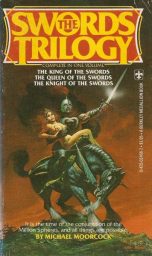 Knight of Swords, The Queen of Swords, and The King of Swords. Each novel depicts the efforts of Corum Jhaelen Irsei to defeat the titular Lord of Chaos in each of three closely related planes/dimensions. Corum is an avatar of the Eternal Champion (like Elric), of a race similar to the Melniboneans. So one of Moorcocks elves by other names. Corum is similarly moody and broody.
Knight of Swords, The Queen of Swords, and The King of Swords. Each novel depicts the efforts of Corum Jhaelen Irsei to defeat the titular Lord of Chaos in each of three closely related planes/dimensions. Corum is an avatar of the Eternal Champion (like Elric), of a race similar to the Melniboneans. So one of Moorcocks elves by other names. Corum is similarly moody and broody.
Cinema (Atomic Junk Shop): I mean, if I count “old-time” as before I was born, they’re not making those anymore, so some day I’ll have seen them all!!!!! Let’s take a look at some more! Dr. Jekyll and Mr. Hyde (1931). Apparently, it’s actually pronounced “Jeek-ill,” not “rhymes-with-heckle,” and this movie is the only one that gets that right. It’s very weird, though. EVERYTHING I KNOW IS WRONG!!!!!
Review (Gravetapping): There was a time not so long ago when serial killer police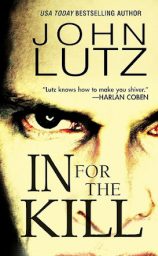 procedurals were everywhere. From film to television to fiction. Perhaps it began with the success of the film, The Silence of the Lambs (1991), inspired by Thomas Harris’s novel, and continued with James Patterson’s early Alex Cross bestsellers—Along Came a Spider, Kiss the Girls, etc. Whenever and whyever the serial killer craze began, one of its best practitioners was John Lutz.
procedurals were everywhere. From film to television to fiction. Perhaps it began with the success of the film, The Silence of the Lambs (1991), inspired by Thomas Harris’s novel, and continued with James Patterson’s early Alex Cross bestsellers—Along Came a Spider, Kiss the Girls, etc. Whenever and whyever the serial killer craze began, one of its best practitioners was John Lutz.
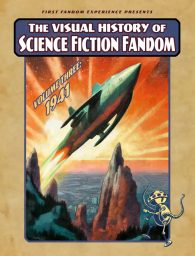 Science Fiction (First Fandom Experience): Science fiction fandom in 1941 played out in a panoply of wisdom, foolishness, belief and incredulity. Less mired than previous years in the economic shackles of the Great Depression, fans let loose in ways both expected and surprising.
Science Fiction (First Fandom Experience): Science fiction fandom in 1941 played out in a panoply of wisdom, foolishness, belief and incredulity. Less mired than previous years in the economic shackles of the Great Depression, fans let loose in ways both expected and surprising.
Fantasy (M Porcius): Today, as part of our sacred quest to explore 1930s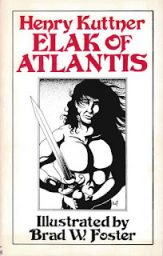 issues of Farnsworth Wright’s influential magazine of the bizarre and unusual, Weird Tales, we are reading one of Kuttner’s sword and sorcery tales, the first Elak story, “Thunder in the Dawn,” a novella serialized over the May and June 1938 issues of WT.
issues of Farnsworth Wright’s influential magazine of the bizarre and unusual, Weird Tales, we are reading one of Kuttner’s sword and sorcery tales, the first Elak story, “Thunder in the Dawn,” a novella serialized over the May and June 1938 issues of WT.
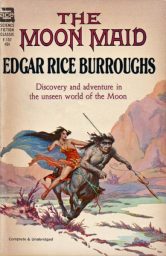 Science Fiction (Dark Worlds Quarterly): Exploration and adventures on our Moon have been around for a while but there is a special place for beautiful women who come from that lifeless rock. The early SF novel, H. G. Wells’s The First Men in the Moon (1901), is aptly named since two men go to the Moon and discover insect-like creatures. No women are along with Cavor and Bedford. No surprise that changed when it was filmed in 1964.
Science Fiction (Dark Worlds Quarterly): Exploration and adventures on our Moon have been around for a while but there is a special place for beautiful women who come from that lifeless rock. The early SF novel, H. G. Wells’s The First Men in the Moon (1901), is aptly named since two men go to the Moon and discover insect-like creatures. No women are along with Cavor and Bedford. No surprise that changed when it was filmed in 1964.
Fantastic Fiction (Vintage Pop Fiction): Roy Norton’s The Land of the Lost is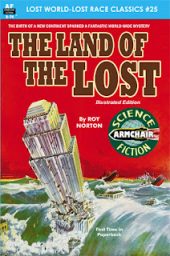 a lost civilisation novel originally published in 1909. The novel starts off seeming like more of an “end of the world” story than a lost world tale. A brilliant scientist named Martinez has predicted catastrophe.
a lost civilisation novel originally published in 1909. The novel starts off seeming like more of an “end of the world” story than a lost world tale. A brilliant scientist named Martinez has predicted catastrophe.
Review (Grim Dark Magazine): In his introduction to Neither Beg Nor Yield: Stories with S&S Attitude, editor and Rogue Blades Entertainment proprietor Jason M Waltz sidesteps the endless hair-splitting. He makes a convincing argument that Sword & Sorcery is all about attitude. S&S heroes stubbornly cling to life, no matter how the odds are stacked against them. According to Waltz, “Sword & Sorcery is a clenched fist thrust into the sky, a raised middle finger in the face of the Unknown.
Westerns (Paperback Warrior): Jack M. Bickham (1930-1997) wrote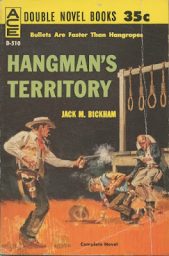 predominantly westerns during his career while also teaching writing at the University of Oklahoma. Hangman’s Territory was half of a 1961 Ace Double later reprinted as a stand-alone paperback.
predominantly westerns during his career while also teaching writing at the University of Oklahoma. Hangman’s Territory was half of a 1961 Ace Double later reprinted as a stand-alone paperback.
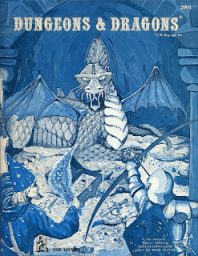 D&D (Grognardia): I’ve been spending a lot of time looking at the examples of play provided in earlier roleplaying games. While not all games from the early days of the hobby include such examples, a great many of them do, starting with original Dungeons & Dragons in 1974. It’s easy to understand why this was the case: RPGs were a genuinely new concept and most people in the 1970s, absent being introduced to them through others, would have required some sort of guidance on how to play them.
D&D (Grognardia): I’ve been spending a lot of time looking at the examples of play provided in earlier roleplaying games. While not all games from the early days of the hobby include such examples, a great many of them do, starting with original Dungeons & Dragons in 1974. It’s easy to understand why this was the case: RPGs were a genuinely new concept and most people in the 1970s, absent being introduced to them through others, would have required some sort of guidance on how to play them.
Authors (DMR Books): My name is Robert Mammone and I live in Melbourne, Australia. I’ve been an avid genre reader since at least the early ‘80s, and due to my love of Doctor Who in the late ‘70s, my interests were on the more fantastical, horror end of the field. Going to high school I was exposed to dozens and dozens of what we now call classic fantasy works – Tolkien, of course, but also Brooks, Donaldson, Burrows, Eddings, Gemmell, Feist, Lovecraft, Howard.
Battletech (Rageaholic): Blaine Lee Pardoe is a renowned author of Sci-Fi, Military Fiction, True Crime and so many others, for nearly 40 years! 2 years ago, he fell prey to the culture war when he was “canceled” by the owners of Battletech… but as the Iron Age ascends, so has he!
St. Patrick’s Day (DMR Books): Robert E. Howard identified with the Irish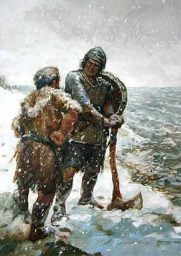 Gaels so strongly that he molded them into his own image. Review the physical characteristics of those Howardian Gaelic Irish heroes I listed above, All of them are tall–REH was statistically on the ‘tall’ side of the spectrum. All of them are black-haired. So was Howard. All are ‘light-eyed’. Back in the day, this referred to those who had blue or grey eyes.
Gaels so strongly that he molded them into his own image. Review the physical characteristics of those Howardian Gaelic Irish heroes I listed above, All of them are tall–REH was statistically on the ‘tall’ side of the spectrum. All of them are black-haired. So was Howard. All are ‘light-eyed’. Back in the day, this referred to those who had blue or grey eyes.
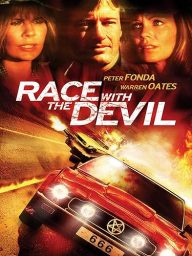 Cinema (Fantasy Literature): The subject of Devil worship is one that the cinema has returned to repeatedly over the decades, and for good reason: Honestly, is there anything much more frightening than a group of people who actually adore and pay homage to the epitome of evil? Any number of interesting films have been brought to the screen concerning these debased sects: Val Lewton’s wonderfully creepy The Seventh Victim (1943), concerning Devil worship in Greenwich Village; Eye of the Devil (1966), an underrated British film starring David Niven and Deborah Kerr.
Cinema (Fantasy Literature): The subject of Devil worship is one that the cinema has returned to repeatedly over the decades, and for good reason: Honestly, is there anything much more frightening than a group of people who actually adore and pay homage to the epitome of evil? Any number of interesting films have been brought to the screen concerning these debased sects: Val Lewton’s wonderfully creepy The Seventh Victim (1943), concerning Devil worship in Greenwich Village; Eye of the Devil (1966), an underrated British film starring David Niven and Deborah Kerr.
Comic Books (Michael K. Vaughan): A ghastly intro to EC Comics.
Science Fiction (Poul Anderson Contributor Articles): I have wondered how S.M. Stirling was inspired to write his four Draka books (MARCHING THROUGH GEORGIA, UNDER THE YOKE, THE STONE DOGS, and DRAKON). One source to investigate is what Stirling himself said, such as the Introduction he wrote for DRAKAS!
Science Fiction (Reactor): Today, we’re going to look at Gordon R. Dickson’s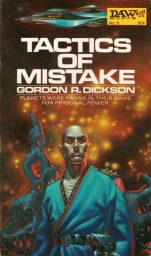 Tactics of Mistake, a seminal tale in his Childe Cycle series, focusing on his most famous creation, the Dorsai mercenaries. This book is full of action and adventure, but also full of musings on history, tactics and strategy, as well as a dollop of speculation on the evolution of human paranormal abilities. It is a quick read that gallops right along, with the scope of the story growing larger with every battle.
Tactics of Mistake, a seminal tale in his Childe Cycle series, focusing on his most famous creation, the Dorsai mercenaries. This book is full of action and adventure, but also full of musings on history, tactics and strategy, as well as a dollop of speculation on the evolution of human paranormal abilities. It is a quick read that gallops right along, with the scope of the story growing larger with every battle.
 Men’s Adventure (Rough Edges): The tenth issue of MEN’S ADVENTURE QUARTERLY is out, this time around focusing on the best stories and artwork from the men’s adventure magazines dealing with the Vietnam war. Those of you who have been following MAQ from the beginning know that it’s one of the best publications out there, and this new issue more than maintains that very high standard. You’d expect nothing less from editors Robert Deis and Bill Cunningham, ably assisted on this issue by Paul Bishop and Rob Morris.
Men’s Adventure (Rough Edges): The tenth issue of MEN’S ADVENTURE QUARTERLY is out, this time around focusing on the best stories and artwork from the men’s adventure magazines dealing with the Vietnam war. Those of you who have been following MAQ from the beginning know that it’s one of the best publications out there, and this new issue more than maintains that very high standard. You’d expect nothing less from editors Robert Deis and Bill Cunningham, ably assisted on this issue by Paul Bishop and Rob Morris.
History (Men of the West): And who was Cortez? He was a poor young Spanish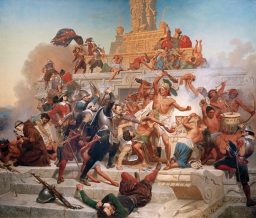 gentleman, son of an infantry captain, who, in his youth, was sickly and weakly; and his father tried to make a lawyer of him, and would have done it, but young Cortez kicked over the traces, as we say, right and left, and turned out such a wild fellow, that he would not stay at college; and after getting into plenty of scrapes, started as a soldier to the West Indies when he was only nineteen. Little did people think what stuff there was in that wild, sickly lad!
gentleman, son of an infantry captain, who, in his youth, was sickly and weakly; and his father tried to make a lawyer of him, and would have done it, but young Cortez kicked over the traces, as we say, right and left, and turned out such a wild fellow, that he would not stay at college; and after getting into plenty of scrapes, started as a soldier to the West Indies when he was only nineteen. Little did people think what stuff there was in that wild, sickly lad!
Please give us your valuable comment